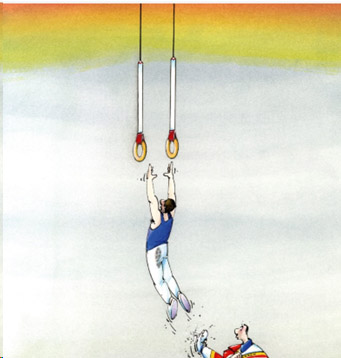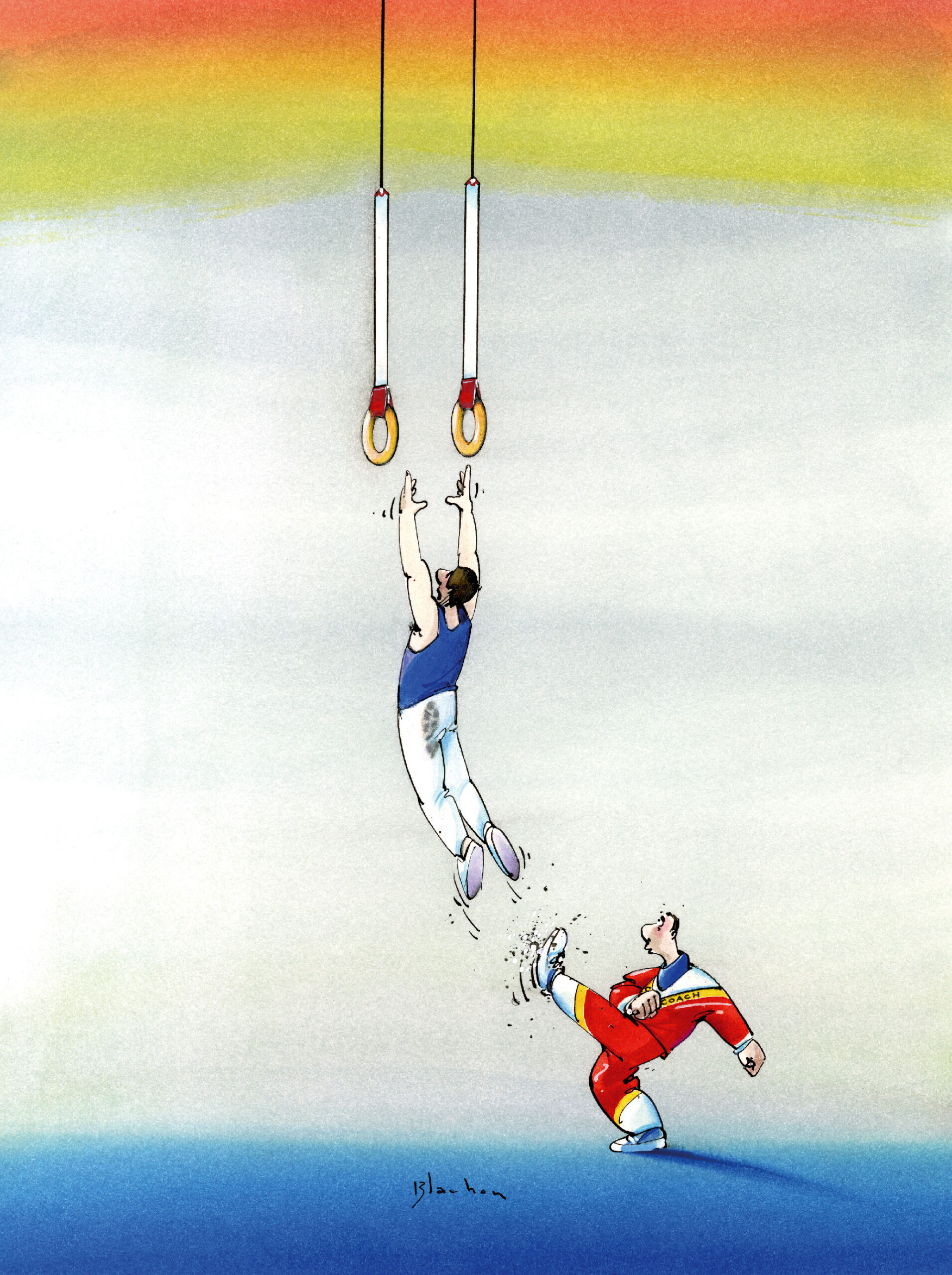


copyright: M. Blachon
WO: What is the role of the coach in improving individual players and the team as a whole?
Szymon: First of all, the coach is a teacher.
WO: And a friend?
Szymon: He can but doesn’t have to be a friend. He has to be a teacher and leader, and needs to win the trust of the players. I think he also needs to be a good psychologist. You can yell at a player and this will work with one, but not with another who would need calm conversation, some praise and positive feedback as well. Can the coach be a friend? At the beginning, when I met Kuba, I called him “Mr. Jakub”. He’s my employer, he is on a higher level than I am, so I feel respect. But it’s also a friendly relationship. During a game there a different coach-team member dynamic is at play. We use the terms “coach” and “player”.
Szymon: The same goes for work, for business…
WO: Michał, how do sports influence the job of school principal? Are you the boss, or part of a team?
Michał: I’ve always seen the coach as a great authority figure, even when I just started playing. My coach was 25 years old, he must have just graduated from university, it was probably his first or second year on the job. For me, as for the whole team, he was someone who knew everything there was to know about basketball. He watched NBA games, which to us was something out of this world, he had uniforms sent over to us by his friends from the U.S. From the very beginning he was a great authority figure, even though when I think about it today he didn’t have a lot of experience or authority in the world of coaching.
WO: Let’s say that you see that during the game one player does something differently compared to what you initially planned. You talk to him after the game and he says “Well, I thought of something new and it worked. We won”. How do you react, as coaches? Do you introduce this new element into the game, or are you against because it was not in the original plan? How do you perceive innovation coming from the team?
Szymon: If this new element works and the team is successful, we are happy. If the person who thought of something new is creative, I think they should be given the opportunity to show creativity. If the point guard comes up with unusual plays let him develop and grow, especially in junior leagues. In senior sports, when big money and huge pressure are at stake, or when it’s the national team, in my opinion there is no room for creativity as it can cost the team too much. However, if I block creativity in a thirteen or fourteen year-old player he will stop growing.
WO: Do you allow risks? Changing plans mid-game?
Szymon: For risks – yes. If a given player is in a particular situation this means that he can do something that another person would not do.
Kuba: Going outside the box means that you are the one to take the risk.
Tomek: You are the one to take the risk because you know you are the best, and you are able to achieve what you have planned. I think that in order to be successful you need to go out of the box sometimes. This is what happens when the best player gets the ball in the last seconds of the game and if he fails, he takes the responsibility for his decision. LeBron James won the game because he scored a tie, blocked, and then scored a win. It was one person, one individual who won – the best player in the world. This is something you cannot plan, it’s impossible to plan a throw or a block
Kuba: It’s a matter of statistics; teams write them out to know what play to make at a given moment.
WO: And what about observing the competition?
Kuba: This works even in junior sports, with eighteen year-olds playing basketball in Poland. The coach is prepared and before the game he shows everyone the patterns of the opposing team. He focuses on their weaknesses, and on elements they’d use most frequently. In handball, a goalie who is going to defend a penalty shot is told how the player he faces threw penalty shots in the past and how he might throw now, how he reacts under stress, when people usually resort to tested solutions
WO: So it’s a standard…
Szymon: The goalie is told that there is 68 percent likelihood that the opposing player will throw in the upper right corner. So I think that the system of checking out the weak points of your opponents, analyzing their game patterns, and finding out how they react in stressful situations proves that sports came first and led the way, before business models were created.
WO: How do you find your best talents, and how do you develop them? You see someone who played out of the box, and that’s your cue? Or do you watch their growth path over a period of time? Do you focus on growing individual talents, or only teams?
Szymon: We care about the whole team, and talents will always stand out. You can scout for talented players, go to school tournaments, pick up boys for your team. You spot talents right away: a boy is nine years old, but he can throw three-point field goals and perform jump shots extremely well. But then, once he is on the team, I won’t treat him in any special way just because he is talented. I treat all the players equally. How would the others feel if I played favorites and kept setting the leader as an example? Everyone is treated the same. The one thing I can do is to give him more difficult tasks during practice, because what is difficult for other boys would come easy and natural for him. In order to grow talents you need to create challenges, expect more and more.
Kuba: This is precisely why the most talented players don’t become coaches; they had it easy since they were nine years old. They tried something twice or three times and had it down pat.
Michał: But at the school we look for talents, of course. Coaches travel to games to watch players. We are trying to grow the business. We have four schools across Poland, we share information, encourage players to develop their talent with us. When someone joins our team we will make sure they stay with us; we organize their sports education and their regular education to help them grow and develop.
Kuba: In junior sports you need to be very cautious because talents can emerge quite late. Marcin Gortat is a great example: he started playing when he was seventeen, which is very late for a basketball player. I am not sure, I’d need to check, but he may be the only player in the history to start playing at the age of seventeen, and then he landed in the NBA. On the other hand, there have been many players who developed their talent and skills very fast, everyone thought they would have great careers as athletes, but this didn’t happen, and one of them works at a fuel station now. They developed faster, had physical capabilities, were talented, but at some point they simply stopped growing.
I spoke to the management team of the Marcin Gortat School:
Michał Feter – principal of the Gortat School in Łódź for the last 4 years. Previously, for 10 years Michał worked as a coach and management advisor (including project management), and was responsible for prospecting external funding for projects, evaluation, and coach competencies. He is the author of over 200 grant projects. From an early age he has been fascinated by sports. Spain is his hobby.
Szymon Nowak – occupational therapist, teacher and publicist by education, who has been active in volleyball for his whole life. He loves working with people and for people. Before joining the Gortat School he worked for the Dziewczynka z Zapałkami and JiM Foundations. At the School he is responsible for marketing and for the development of the volleyball project. Coordinator of the Gortat School Business Club. He does what he loves by working in sports.
Tomasz Solarek – graduate of the University of Łódź with a degree in English. He used to play basketball for the ŁKS sports club and the University of Łódź, and worked for 7 years for the Marcin Gortat MG13 Foundation, where he was responsible for coordinating the Marcin Gortat Camp project. At present, he works for the Gortat School and the Gortat School Business Club. He is responsible for collaboration with American colleges to prospect sports scholarships in the U.S. for Gortat School students.
Jakub Urbanowicz – graduate of the Łódź University of Technology with a degree in Management. He used to play basketball for the ŁKS sports club and the Łódź University of Technology. He is responsible for the development of Marcin Gortat Schools in Łódź, Kraków, Poznań, and Gdańsk. Co-creator of the Gortat School Business Club. President of the ŁKS Male Basketball Association.
Passion2Value The concept of conversations and projects based on the combination of passions and values from various fields. By working in a specific setting, exercising or developing your passions, e.g. in sports or music, based on broader knowledge and skills from other disciplines, you can learn something as an academic discipline. You can create valuable things and enjoy yourself, at the same time.


